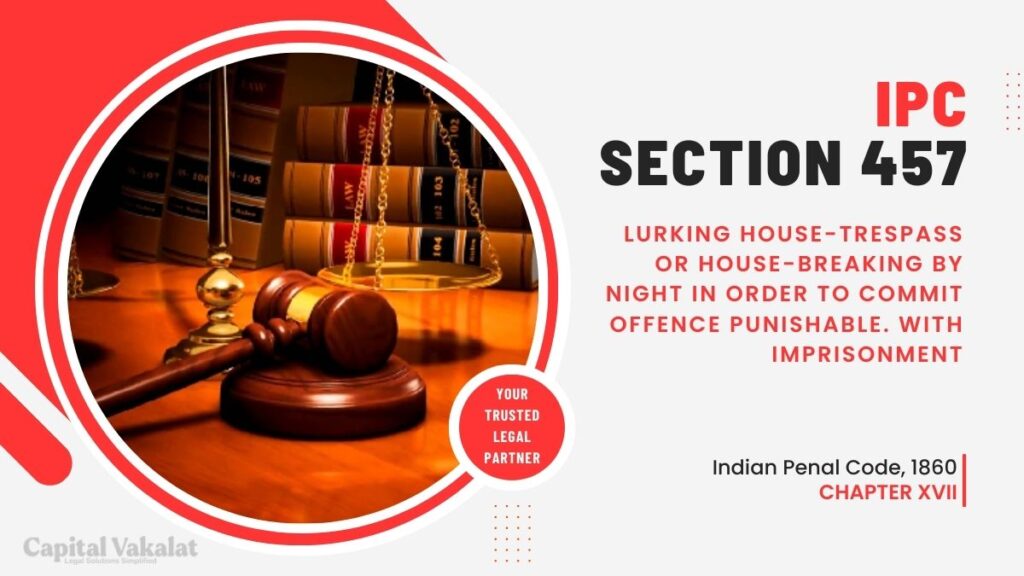In the realm of legal statutes, Section 457 of the Indian Penal Code (IPC) holds a distinctive position, dealing with lurking house-trespass or house-breaking by night in order to commit an offence punishable with imprisonment. This provision is crucial for maintaining the sanctity of private spaces and ensuring the safety of individuals and their property.

In this article, we will delve into the intricacies of Section 457 IPC, exploring its definition, historical context, intent, challenges in enforcement, and its relevance in the modern legal landscape.
Understanding Section 457 IPC
Section 457 IPC specifically addresses the act of lurking house-trespass or house-breaking by night with the intention of committing an offence punishable by imprisonment. To comprehend the gravity of this provision, it’s essential to distinguish between lurking house-trespass and house-breaking. While the former involves entering a property stealthily with malicious intent, the latter encompasses a more forceful entry during the night.
The elements of lurking house-trespass involve not only trespassing but also a concealed presence, adding an element of stealth to the criminal act. The severity of the offence is reflected in the punishment prescribed by the law.
Historical Context
To grasp the essence of Section 457 IPC, a journey through its historical evolution is indispensable. The laws surrounding trespass and house-breaking have undergone significant changes over the years, with amendments aimed at adapting to the evolving societal norms. A historical perspective sheds light on the legislative intent and the societal concerns that shaped these laws.
Cases and Precedents
Legal precedents play a pivotal role in interpreting and applying Section 457 IPC. Analyzing notable cases involving lurking house-trespass provides insights into the judicial interpretations and the implications of these cases on the legal landscape. Understanding how the courts have addressed such offences helps in navigating the complexities of the law.
Intent and Punishment
Unraveling the intent behind lurking house-trespass is crucial for appreciating the severity of the punishment prescribed. The law aims to deter individuals from engaging in clandestine activities within private premises. Examining the punishment associated with this offence underscores the gravity with which the legal system views such actions.
Challenges in Enforcement
While the law is clear in its prohibition of lurking house-trespass, its enforcement poses challenges. Proving a concealed and malicious presence within a property requires thorough investigation and substantial evidence. Identifying and addressing these challenges is vital for the effective implementation of the law.
Relevance in Modern Society
In an era dominated by technological advancements, the relevance of laws like Section 457 IPC is subject to scrutiny. Adapting traditional legal provisions to contemporary circumstances is a pressing concern. The role of technology in preventing and combating house-trespass adds a layer of complexity to the enforcement mechanisms.
Comparative Analysis with Other Legal Provisions
Section 457 IPC does not exist in isolation; it is part of a broader legal framework. Contrasting it with related sections helps in understanding the nuanced differences and the specific circumstances each provision addresses. A comparative analysis provides a comprehensive view of the legal arsenal against crimes of this nature.
Public Awareness and Prevention
Preventing lurking house-trespass requires a collective effort involving both law enforcement and the public. Enhancing public awareness about the implications of such offences and fostering community initiatives can contribute significantly to prevention. Collaboration between communities and law enforcement agencies is crucial for creating a secure environment.
Conclusion
In conclusion, Section 457 IPC stands as a bulwark against lurking house-trespass, emphasizing the sanctity of private spaces. Its historical evolution, judicial interpretations, intent, and challenges in enforcement collectively highlight its significance. Adapting this provision to modern circumstances, fostering public awareness, and addressing enforcement challenges are essential for its continued efficacy.
Frequently Asked Questions
What is the punishment for lurking house-trespass under Section 457 IPC?
The punishment for lurking house-trespass includes imprisonment, the severity of which depends on the specific circumstances of the offence.
How has technology impacted the enforcement of Section 457 IPC?
Technology has added complexity to enforcement by introducing new challenges in identifying and preventing lurking house-trespass. However, it also offers tools for enhancing security measures.
Can a property owner use force to prevent lurking house-trespass?
Property owners have the right to use reasonable force to protect their property, but the extent of force must be in accordance with the law.
Are there any proposed amendments to Section 457 IPC?
As of the latest information available, there are no specific proposed amendments to Section 457 IPC. However, legal provisions are subject to periodic review and modification.